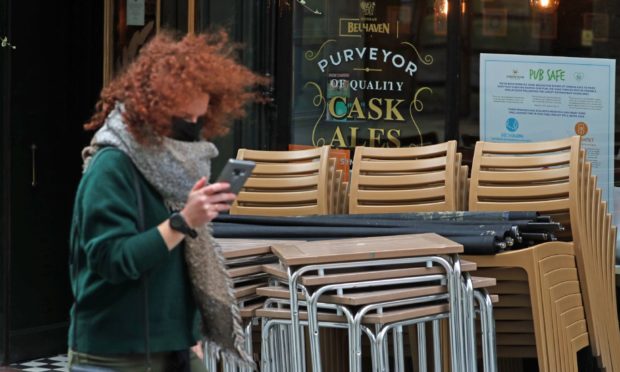One of Scotland’s leading public health experts has said a blanket system of restrictions would be a simpler way of suppressing Covid-19 than local measures.
Professor Linda Bauld said introducing nationwide measures for up two or three weeks would be a “more straightforward” way of dealing with the crisis and having different rules for different areas risked division.
Her remarks came after Nicola Sturgeon announced that Scotland would be introducing a “tiered” system of restrictions similar to that in operation south of the border when she unveils a new strategic framework for dealing with the virus later this month.
My personal view is that it would be more straightforward just to say this is what’s going to happen to everybody for a couple of weeks or three weeks. From a communication and policy perspective that is much more straightforward and everybody knows exactly where they are.”
Professor Linda Bauld
Already Ms Sturgeon has announced tighter restrictions for the five worst affected Scottish health board areas: Greater Glasgow and Clyde; Lothian; Lanarkshire; Ayrshire and Arran and Forth Valley. Earlier in the pandemic Aberdeen was put into local lockdown.

The first minister has also said the government is considering a travel ban between areas of high prevalence such as Glasgow and areas of low prevalence like the Highlands.
Current restrictions were put in place on October 9 and are due to expire on October 26. They prevent the sale of alcohol in pubs and restaurants in the five Central Belt health board areas. Elsewhere alcohol can only be consumed outside.
Professor Bauld, a public health expert at Edinburgh University, also said she was “pessimistic” that the Scottish Government would be in a position to ease current restrictions on hospitality on October 26.
Looking at the English experience, Professor Bauld said it was “damaging” that the restrictions on places like Manchester imposed by the tiered system had produced local opposition.
“I think the problem is when you get this push back from somebody who is very well respected like Andy Burnham it does create division,” Professor Bauld said.
“So just from a public health perspective it is damaging – problematic.”
Professor Bauld said there was “a risk” that similar problems could result in Scotland, saying that the division was “inevitable” the longer the crisis goes on. But she said problems could be “ameliorated” with better communication.
“I mean my personal view is that it would be more straightforward just to say this is what’s going to happen to everybody for a couple of weeks or three weeks,” Professor Bauld said.
“From a communication and policy perspective that is much more straightforward and everybody knows exactly where they are. But that’s not the way things are moving in Europe. You see these localised approaches all around the place on the continent.”
Professor Bauld was downbeat about hospitality businesses benefiting from an easing of measures on October 26.
“I’m pessimistic and this is absolutely a personal view. It is not informed by discussions with my colleagues who are advising the government,” she said.
“It is purely from an epidemiological point of view. When they said two weeks, I thought that’s really interesting. How are you going to know after two weeks? Because it takes, if you think about the fact that it does take time for symptoms to develop. And it can be, on average, it is about five or six days, it can be up to 14 days. You are not going to see a big shift in the numbers after two weeks.”
She added: “I’m not optimistic, but I’m not making any of the decisions. I don’t know, but they may feel that the risk to the businesses is too great and they give it a go.”
The Aberdeen local lockdown
She added that she sympathised with Aberdeen businesses which had earlier been hit with a earlier local lockdown and understood why they might feel aggrieved at the way it had been handled.

“When you look at the levels (of Covid) that were occurring in Glasgow when they introduced the household mixing ban, they were already higher than what Aberdeen had when they introduced their lockdown,” she said.
“You do get those comparisons between areas and people will feel they are unfairly dealt with. The other thing I would say is the longer this goes on the more division there is because it is just inevitable.”
She added: “I understand why they (Aberdeen councillors and businesses) were aggrieved but in crisis mode, dissent is not helpful is it? But I am sympathetic to why they would have (felt hard done by).”
Nicola Sturgeon’s new framework strategy
Despite her view that a unified nationwide measures would be simpler to communicate, she understood the reasoning behind the tiered approach.
Professor Bauld said one aim of the new framework would be to clear up ambiguity on why decisions were being taken.
“People don’t know what’s happening behind closed doors, they are not clear on the decision-making. So she’s responding to that. At least by having a framework those things will be clear,” Professor Bauld.
A second reason was to respond to those in rural areas like the Highlands and the islands, who believe they are being penalised for high Covid-19 prevalence elsewhere in the country.
A third reason, according to Professor Bauld, was the first minister’s efforts “not to cripple the whole country in terms of shutdowns when there’s not adequate financial support in place”.
Speaking during her daily media briefing earlier this month, the first minister said Scotland was facing a “sharply rising rate of infection” but was “particularly pronounced” in the central belt.
She added: “If this was a purely one-dimensional decision – where the immediate harm caused by Covid-19 was the only thing we had to consider – it is possible that we would move in the direction of measures much closer to the kind of lockdown we had in March.
“But, seven months in, this can’t be and is not a one dimensional decision – it is very much a multi-dimensional decision.
“We have to very carefully balance all the different harms caused by the pandemic.”

